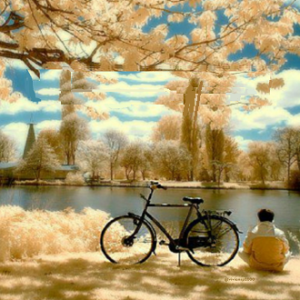
Inner life and happiness
We live in pure exteriority, modern man does not know the interior life, he is projected onto things and actions, he believes he can extract from it what is missing internally.
know the interior life, he is projected onto things and actions, he believes he can extract from it what is missing internally.
Byung-Chul Han in his essay “Vita Contemplativa” [contemplation life] quotes a short story by Walter Benjamin “Do not forget the best” in which he recalls a little shepherd boy, “who is allowed, on “a Sunday”, to enter the mountain of his treasures, but with the cryptic instruction: “don’t forget the best”. The best means not doing it.” (Han, 2023, pg 33).
Reading Being in modernity, Han writes: “The crisis of the present consists of everything that could give meaning and guidance to life and is breaking. Life does not rely on anything resistant to support it.” (pg. 87), recalls quoting Hanna Arendt who claims to “find uncertain shelter in the darkness of the human heart” which still has the ability to say: “to remember and say: forever” (idem) and remembers immortality in this aspect.
When contemplating the being that has a temporal dimension: “It grows long and slowly. The current short term dismantles it.” (pg. 89) and quotes Niklas Luhmann about the (current) information: “His cosmology is a cosmology not of being, but of contingency” (pg. 89 quoting Luhmann).
But it remembers immortality translated in this crisis as: “The search for immortality, for immortal glory, is, according to Arendt, “the source and center of the vita activa.” Human beings achieve their immortality on the political stage” (pg. 145), but true immortality is the eternal.
Then Han writes: “In contrast, the vita contemplativa is not, according to Arendt, persisting and lasting in time, but the experience of the eternal, which transcends both time and the surrounding world.” (idem page 145).
Arendt admires Socrates, writes Han, “who voluntarily renounces immortality” (pg. 146) and thus remembers that even writing becomes vita activa, and creates a temporary immortality, which Han remembers that Arendt also sought when writing.
But it is not a question of abandoning the complement of the vita contemplativa which is the vita activa, what happens is that the “animal laborans” (as Arendt calls the modern one): “is ruining all human capacities, especially action” (Han, 2023, p. 149).
Remember that the capacity for action arises from thought “which is not irrelevant to the human future, because if we considered the different activities of the Vita activa [active life] in relation to the question of which of them would be the most active and in which of them the experience of the active being would be expressed in a purer way, then the result would be that thought all activities with regard to pure active being” (Han, 2023, pgs. 149-150).
So it is not from our outside that our bad actions come from, but rather they are inside us.
Han, B.-C. (2023). Vita contemplativa. Trans. Lucas Machado. Brazil, Petrópolis: Ed. Vozes.









